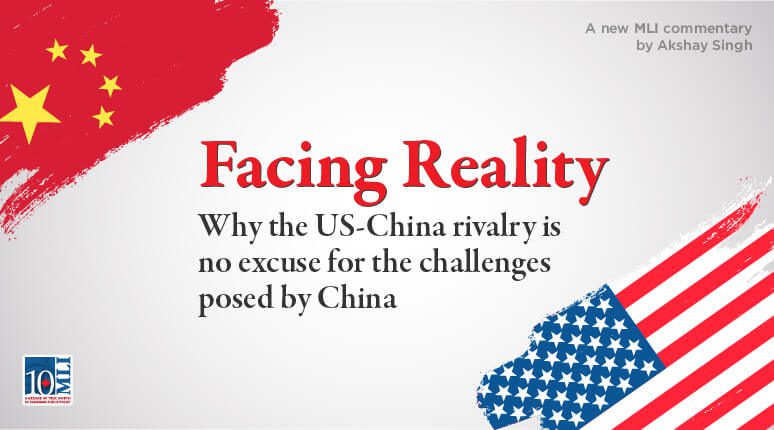 OTTAWA, ON (October 7, 2020): The “China challenge” is often framed within the context of the US-China strategic rivalry. However, this narrative has often been used as an excuse to ignore China’s increasingly belligerent behaviour – in which issues that arise between China and other states are relegated to simply being an outcome of this US-China rivalry rather than being directly attributed to China’s aggressive actions. In such a formulation, affected states are simply de facto battlegrounds for great power politics.
OTTAWA, ON (October 7, 2020): The “China challenge” is often framed within the context of the US-China strategic rivalry. However, this narrative has often been used as an excuse to ignore China’s increasingly belligerent behaviour – in which issues that arise between China and other states are relegated to simply being an outcome of this US-China rivalry rather than being directly attributed to China’s aggressive actions. In such a formulation, affected states are simply de facto battlegrounds for great power politics.
In a new MLI commentary titled “Facing Reality: Why the US-China Rivalry is no Excuse for the Challenges posed by China”, Akshay Singh argues against framing bilateral irritants solely within the context of the US-China rivalry. As he notes, this narrative provides an “out” to ignore the real challenges posed by the People’s Republic of China (PRC).
“Some analysts would like to believe that China does not pose unique challenges to middle powers, and that such challenges would not exist in the absence of US-China competition,” explains Singh.
As Singh writes, according to this logic, middle powers are increasingly being pushed to take sides by either the US or China. This push then leads to increased friction and pain for some of these powers, with certain states being “trapped” between the interests of the US and China, reducing any leverage a state may have. This results to some unsatisfying conclusions:
- If the US-China strategic rivalry did not exist, there would be no, or significantly fewer, bilateral issues between various states and the PRC.
- Middle powers are not capable of making values- or interest-based foreign policy decisions and only support either the US or China.
- There is no clear ideological or normative benefit in choosing one power over the other on critical issues of national importance.
This simplistic view ignores the years of evidence of China’s challenges for liberal democracies. There are well-documented cases of intellectual property theft, state-sponsored cyber intrusion campaigns, foreign interference efforts, and human rights concerns. Regardless of the US-China strategic rivalry, middle powers would still face the same PRC-related challenges.
As Singh notes, “By pushing this narrative, Beijing is able to reframe the debate in simplistic terms in spite of real concerns.”
Moving forward, Canada should refute the simplicity of framing challenges with China through the lens of the US-China strategic rivalry. We need to make choices in a sovereign manner which protects our interests most, and should not be intimidated by accusations that by looking to protect these values they are “anti-China” or “pro-US.”
“In the coming years, middle powers will have to make certain difficult and uncomfortable decisions to protect key partnerships, as well as their own core interests,” writes Singh. “Canada should look to grow cooperation with diverse client bases around the world, thereby potentially mitigating damages caused by short-term retribution for foreign policy decisions that ultimately best serve Canada and its allies.”
Read the full commentary here.
***
Akshay Singh is an international affairs and security scholar and a nonresident research fellow at the Council on International Policy. He holds an MA and BA from Simon Fraser University, where he focused on political science, history, and international security issues
For more information, media are invited to contact:
Brett Byers
Communications and Digital Media Manager
613-482-8327 x105
brett.byers@macdonaldlaurier.ca




